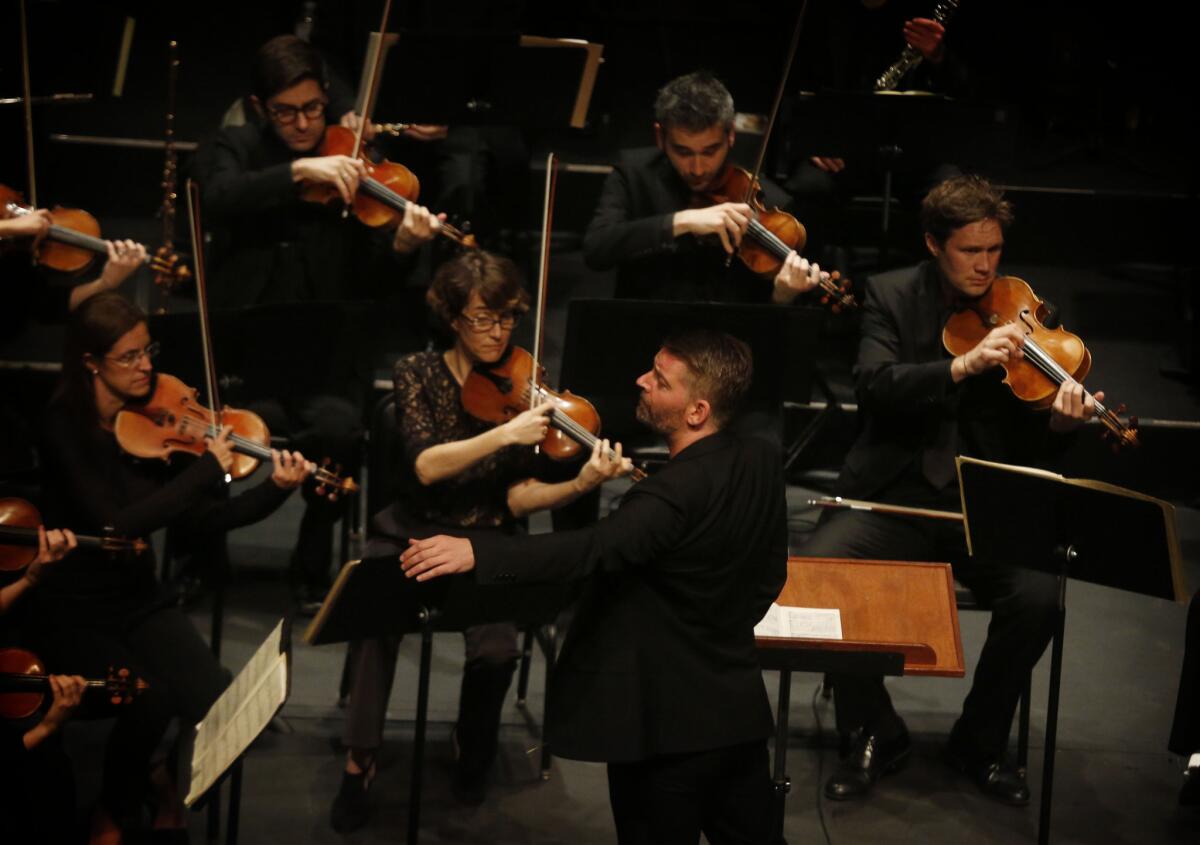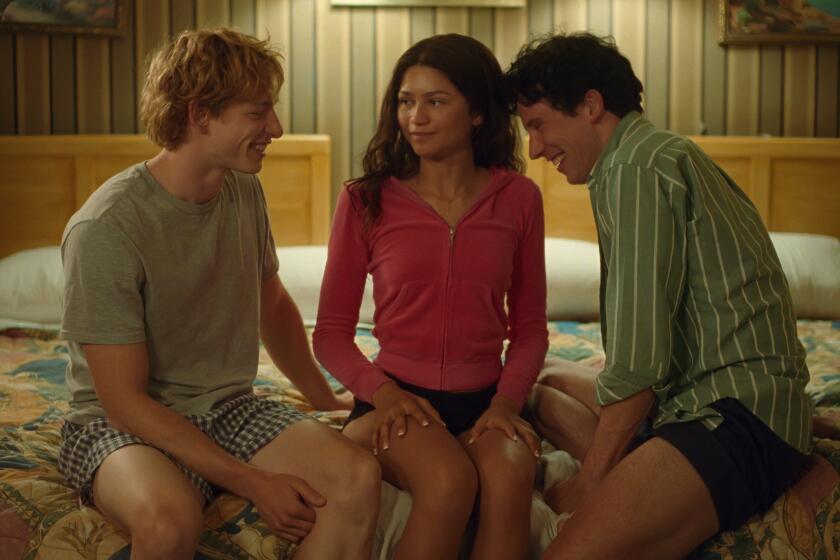Review: A great first date for the L.A. Chamber Orchestra and Matthias Pintscher. Will there be a second?

Matthias Pintscher hit all the right notes in his Royce Hall debut with L.A. Chamber Orchestra.
Could Matthias Pintscher be the next music director of Los Angeles Chamber Orchestra?
Not long ago, a fast-rising high-modernist German composer, conductor and educator following in Pierre Boulez’s footsteps would have seemed perhaps the single least likely figure to lead one of our city’s more traditional ensembles. But Pintscher’s debut program with the orchestra Sunday night in Royce Hall was a superb concert that had all the appearances of love at first sight between conductor and orchestra.
LACO is, in fact, changing with the times and beginning to turn its attention to some of today’s hottest young composers. And as the L.A. new music scene grows larger and hipper practically by the week, anything might happen. But there is much to consider.
See more of Entertainment’s top stories on Facebook >>
Last season LACO began auditioning conductors after its popular music director, Jeffrey Kahane, announced that he would be stepping down in 2017 at the end of his 20th season. The orchestra doesn’t have much of a history of taking a chance on promising new talent, such as Karina Canellakis, an assistant conductor of the Dallas Symphony who made a spectacular debut last season (and who already may be on the shortlist for the San Diego Symphony or even Dallas). But that approach could attract the elusive younger audience. Then again, the safest bet may be to rely on a tried-and-true conductor who would appeal to core subscribers.
Pintscher’s concert on Sunday did not answer the basic question of what LACO is looking for, but it did leave behind a tantalizing prospect for the future. With Fauré’s Pavane, Schoenberg’s Chamber Symphony No. 2, Ravel’s “Mother Goose” and Beethoven’s Eighth Symphony, the program itself was out of the ordinary only for the conductor. This was unchallenging standard repertory except for the Schoenberg, and even that wasn’t a huge stretch. It was completed in 1939, when Schoenberg taught at UCLA, but the score is a reworking of a piece, romantic in its roots, begun in the early years of the century. Kahane conducted it shortly after he became LACO music director.
Pintscher, on the other hand, happens to be music director of Ensemble Intercontemporain, the Parisian new music group founded by Boulez that champions an uncompromisingly edgy European music we rarely hear in the U.S. Pintscher also has formal associations with the BBC Scottish Symphony and the Danish National Symphony, keeping them up to date with the uncompromisingly edgy European music that American orchestras avoid like the plague. He now adds the newly appointed position of principal conductor of the Lucerne Festival Academy Orchestra, with which he oversaw an impressive day of Boulez performances at last summer’s festival.
This, of course, brings up one other point. Pintscher is busy. Living in Paris and New York, he also teaches composition at the Juilliard School, and his guest conducting calendar is growing. (He made his Berlin Philharmonic debut in the fall.) He doesn’t need LACO. The orchestra didn’t even have him bring along one of his own works. But conducting with rapt enthusiasm Sunday at Royce, Pintscher looked like someone who wanted LACO. And responding with like rapt enthusiasm, the LACO musicians played like an orchestra that wanted him.
There were no revelations on this occasion, just really good, intense playing and interpretations that made good hard sense. For all his advocacy of the avant-garde, Pintscher may be something of a romantic at heart. His conducting style is not in the cool new-music mold but broad and probing. He likes heavy textures and lushness and lavish expressivity.
Most of all, Pintscher juices sounds. In Ravel’s “Mother Goose,” he went for bursts of flavor from every instrument, putting great emphasis on the sonic equivalent of neon lighting for color and effect. He wiped clean all residue of schmaltz from Fauré’s Pavane, but only so that the wistful lyricism could stand on its own.
In brief remarks to the audience, Pintscher described Schoenberg’s work as music coming right where Brahms left off, and it was a sensual Brahmsian luxuriance that Pintscher brought out. Beethoven’s Eighth Symphony was full of rhythmic spirit and élan. LACO sounded enthusiastically at home at every turn of every work.
Still, this does not tell us what a Pintscher music directorship would be like. Would he be an absentee leader who merely used the orchestra to build his repertory of standard works? Would he put his own stamp on the orchestra, bringing to us new music to which even the Los Angeles Philharmonic pays little heed?
Would his presence have the potential to tap into the burgeoning young art scene downtown and around town? LACO missed a chance to test those waters with this concert; it neither appealed to, nor drew, a new audience. But the very fact that Pintscher is a serious candidate, that the players already voted with their instruments, is an encouraging sign that all of these necessary concerns must be on the orchestra’s mind.
Twitter: @markswed
More to Read
The biggest entertainment stories
Get our big stories about Hollywood, film, television, music, arts, culture and more right in your inbox as soon as they publish.
You may occasionally receive promotional content from the Los Angeles Times.











